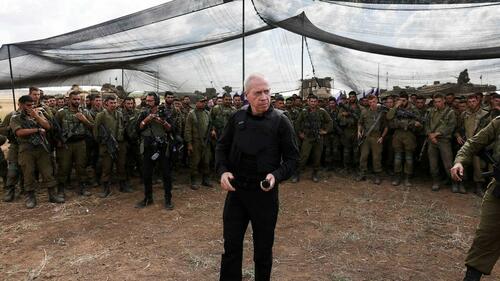
Despite daily exchanges of fire, and deaths on both sides of the border, the fighting between Israel and Hezbollah has not yet spiraled into unlimited war. At a moment Israel's military remains bogged down in its biggest counter-terror operation ever in Gaza, certainly Israeli leaders are hoping to avoid a major northern front battle.
Likely this desire to contain the conflict is what is behind fresh remarks by Israel’s defense minister Yoav Gallant, who on Monday told reporters that his country is open to inking a possible agreement with Iran-backed Hezbollah for 'security guarantees' to stabilize the Lebanese border.

"If Hezbollah will allow an agreement process, and I won’t go now into its details, but clearly it cannot be that it does not include a situation in which there is a safe distance from our fence to forces that could shoot into Israeli territory or forces that could take action inside Israel. If this is possible, with the appropriate guarantee, we can talk about it," Gallant told the press briefing. He wants the threat to Israel's population to be removed.
Soon after Oct.7, Israel began evacuating dozens of towns and settlements near the border, to within 2km of it, after Hezbollah rockets began raining down. Gallant floated a deal that would allow Israeli residents to return.
Commenting on the defense minister's words, Al Jazeera cited Israeli sources to say that the plan envisions American and French peacekeeping troops on either side of the border:
He did not give any more details, but Israeli sources have been quoted as saying that this would involve the deployment of French troops on the Lebanese side of the border and American soldiers on the Israeli side of the border.
So France and America would give some sort of security guarantees.
The idea of the White House agreeing to put US boots on the ground related to the conflict remains highly unlikely, given also the Pentagon's past disastrous experiences in Lebanon, such as the 1982 Marine barracks bombing. To position US troops within kilometers of Hezbollah would in effect make them sitting ducks.
A similar plan was floated by Israel related to the 2006 war, but it merely resulted in an enlargement of UN peacekeeping forces in the south, which had no mandate or capability to disarm Hezbollah.
Israeli retaliation in southern Lebanon has grown bigger and bigger...
⚡️4 people sustained various injuries in the town of Aitaroun after a number of homes were bombed in southern Lebanon. pic.twitter.com/lQNoBgJjHO
— War Monitor (@WarMonitors) December 10, 2023
Israel would like nothing more than to have US troops deployed on a large-scale on its soil. Already most of Israel's military arsenal derives from the US, but an on the ground deployment would serve to draw Washington deeper in on Tel Aviv's side than ever before.
Despite daily exchanges of fire, and deaths on both sides of the border, the fighting between Israel and Hezbollah has not yet spiraled into unlimited war. At a moment Israel’s military remains bogged down in its biggest counter-terror operation ever in Gaza, certainly Israeli leaders are hoping to avoid a major northern front battle.
Likely this desire to contain the conflict is what is behind fresh remarks by Israel’s defense minister Yoav Gallant, who on Monday told reporters that his country is open to inking a possible agreement with Iran-backed Hezbollah for ‘security guarantees’ to stabilize the Lebanese border.

“If Hezbollah will allow an agreement process, and I won’t go now into its details, but clearly it cannot be that it does not include a situation in which there is a safe distance from our fence to forces that could shoot into Israeli territory or forces that could take action inside Israel. If this is possible, with the appropriate guarantee, we can talk about it,” Gallant told the press briefing. He wants the threat to Israel’s population to be removed.
Soon after Oct.7, Israel began evacuating dozens of towns and settlements near the border, to within 2km of it, after Hezbollah rockets began raining down. Gallant floated a deal that would allow Israeli residents to return.
Commenting on the defense minister’s words, Al Jazeera cited Israeli sources to say that the plan envisions American and French peacekeeping troops on either side of the border:
He did not give any more details, but Israeli sources have been quoted as saying that this would involve the deployment of French troops on the Lebanese side of the border and American soldiers on the Israeli side of the border.
So France and America would give some sort of security guarantees.
The idea of the White House agreeing to put US boots on the ground related to the conflict remains highly unlikely, given also the Pentagon’s past disastrous experiences in Lebanon, such as the 1982 Marine barracks bombing. To position US troops within kilometers of Hezbollah would in effect make them sitting ducks.
A similar plan was floated by Israel related to the 2006 war, but it merely resulted in an enlargement of UN peacekeeping forces in the south, which had no mandate or capability to disarm Hezbollah.
Israeli retaliation in southern Lebanon has grown bigger and bigger…
⚡️4 people sustained various injuries in the town of Aitaroun after a number of homes were bombed in southern Lebanon. pic.twitter.com/lQNoBgJjHO
— War Monitor (@WarMonitors) December 10, 2023
Israel would like nothing more than to have US troops deployed on a large-scale on its soil. Already most of Israel’s military arsenal derives from the US, but an on the ground deployment would serve to draw Washington deeper in on Tel Aviv’s side than ever before.
Loading…





